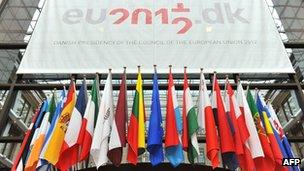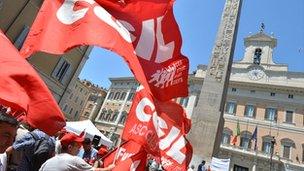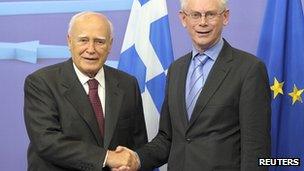European leaders try again!
- Published
- comments

Tomorrow's summit is the latest billed as more important than the previous ones
It tells you something that you can debate in Brussels whether this is the 19th or 20th summit since the eurozone crisis began. Each is billed as more important than the last.
This one has already been declared "perhaps the most important since the foundation of the EU" by Charles Fallara, the man intimately involved in getting banks to take losses in Greece.
Mario Monti, the Italian prime minister, has said he is prepared to stay in Brussels until Sunday rather than walk away with another unconvincing outcome.
The President of the European Commission, Jose Manuel Barroso, said: "This crisis is the biggest threat to all that we have achieved through European construction over the last 60 years."
Yet different countries have different expectations of this summit. The Italians and the Spanish are looking for short-term emergency measures. There is a note of desperation creeping into the comments of the Spanish Prime Minister Mariano Rajoy.
On Wednesday, he said: "The most urgent issue is financing. We can't continue for a long time to finance ourselves with these prices; there are many institutions and financial entities that don't have access to financial markets."
At the prices it is having to pay, Spain is effectively being shut out of the markets.
Italy, too, is seeing its borrowing costs rise. It has a debt pile of 1.95tn euros (£1.56tn). It needs to raise 215bn euros a year to support that. The question hovering over Italy is whether it can finance its own debt.
Mr Monti claims Italy has done all the right things; tightening its budget and reforming its economy. He says that if the public see bad signals coming back from the markets, then people might say "let European integration, let the euro, let this or that large country go to hell", which would be a disaster for the whole European Union.
All of that is intended to turn the screw on Europe's leaders. What the Spanish and Italian leaders want to see is a pooling of debt in the eurozone. Otherwise, they believe the markets will push these two large economies towards a bailout which the EU could not afford.

If countries like Italy are to become competitive, there will have to be a revolution in the work culture
The Italians and the Spanish also want to see money from the eurozone's bailout funds go directly to bolster the banks - rather than via governments - and to buy sovereign bonds.
In all this, they have an ally in French President Francois Hollande. He is now seen as the leader of the "Southern Camp" or "Club Med" group of countries.
Budget control
German Chancellor Angela Merkel has already accepted that all the pressure will be on Germany to deploy its taxpayers' money to lower the borrowing costs for Spain and Italy.
She has said she is concerned that in Brussels too much of the discussion will be about joint liability and not enough about controlling national budgets.
In her view, pooling debt is dangerous and meaningless unless countries prove they can manage their budgets.
So she wants countries to hand over big chunks of their sovereignty to allow Brussels to essentially control their budgets. Only then might she relax and share some of the debt, but she has made it clear that Europe would not have total mutual debt "as long as I live".
The French are wary of ceding more sovereignty to unelected officials in Brussels. Even within President Hollande's own Socialist Party, it will be a hard sell. He wants "solidarity" now and more integration later.
On Wednesday night, the two leaders met in Paris, but they did not resolve their differences.
In the past, the European Union has been dependent on the German-French partnership to drive the project forward. At the moment they are far apart.
"Unless France and Germany can soon agree on a grand bargain, disaster may loom," said analyst Charles Grant of the Centre for European Reform.

The Greek crisis is judged to be on hold - for now
'Growth pact'
There is increasing recognition that the eurozone cannot be fixed by firefighting. Two recent events have left a deep impression.
Some 100bn euros were made available to Spain to fix its banks. The expectation was that it would calm the markets. It did - but just for five hours. Then investors realised the rescue only increased Spain's debts.
Secondly, there was the Greek election. The parties that supported the bailout deal with the EU and the IMF managed to put together a coalition. The threat of Greece leaving the euro receded, but the markets were unimpressed. The Greek crisis is judged to be on hold.
What officials have concluded is that the crisis is systemic. The design of the currency itself is flawed. What it needs to survive is "genuine" economic and monetary union with a big step towards closer integration.
Such a plan, external - drawn up by the President of the Council Herman Van Rompuy - will be on the table at the summit. It is light in detail and for the long term, 10 years down the road. The hope is that getting Europe's leaders to endorse such a vision will persuade the markets of the determination to defend the euro and and to fix its flaws.
There will be agreement at this summit. The leaders will sign off on a growth pact pumping 130bn euros into growth projects like infrastructure. There is not much new money in this, but President Hollande will be able to claim it as a success.
The first steps will be taken towards a banking union, although the leaders are unlikely to agree to a joint deposit guarantee scheme. The UK will not be part of a banking union and will be on guard to ensure that any banking union does not undermine the single market.
Early days
But will this summit be a game changer? If it is, it will be a surprise. Angela Merkel herself has said there are no "quick or easy solutions".
The Italians and the Spanish like to claim they have done everything they can to reform their countries. Mario Monti likes to say they are "virtuous". Now he believes it is up to Europe.
Yet the leaders of Spain and Italy are only starting their reforms, and they have not yet told their people that if they are to be competitive in the future, there will have to be a cultural revolution in the way they work.
Even if no big decisions are taken at this summit, the direction of travel may be set and that is important.
Europe could be heading for a closer union which as one German paper noted "effectively means giving up national budget autonomy. The core of parliaments would be transferred to a Brussels authority".
A vision for the future but, in the short term, the storm rages.